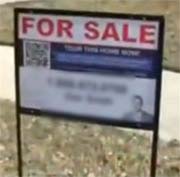- Are You Making This Expensive Thermostat Error This Winter?
- Recognizing the Signs of Hypothyroidism
- 10 Strategies to Overcome Insomnia
- Could Artificial Sweeteners Be Aging the Brain Faster?
- Techniques for Soothing Your Nervous System
- Does the Water in Your House Smell Funny? Here’s Why
- Can a Daily Dose of Apple Cider Vinegar Actually Aid Weight Loss?
- 6 Health Beverages That Can Actually Spike Your Blood Sugar
- Treatment Options for Social Anxiety Disorder
- Understanding the Connection Between Anxiety and Depression
Foreclosures May Raise Neighbors’ Blood Pressure


The housing crash of the late 2000s lowered property values across the nation, but it may have increased something — the blood pressure of folks living next to a foreclosed property.
A new study has found that people who live within 100 meters (about 300 feet) of a foreclosed home tend to have slightly higher blood pressure than other people in the neighborhood. And each additional foreclosed property located in the 100-meter radius appeared to create extra increases in blood pressure, the researchers found.
Such homes, if owned by a bank, can sit vacant for months or years, potentially deteriorating into a run-down eyesore.
“This huge housing crisis is affecting our physiology,” said lead author Mariana Arcaya, a Yerby Postdoctoral Research Fellow at the Harvard Center for Population and Development Studies in Cambridge, Mass. “It’s getting under our skin and affecting the function of our bodies.”
Home foreclosures spiked in the United States between 2007 and 2010, when more than 6 million homeowners fell behind on their mortgage payments and banks stepped in to seize their property.
Previous research has found that being in foreclosure is linked to mental and physical health problems, but to date no one has examined how a foreclosure might affect the health of surrounding neighbors, Arcaya said.
Researchers reviewed data from 1,740 people living in Massachusetts between 1987 and 2008. These people are participants in the Framingham Offspring Cohort, which is part of the landmark Framingham Heart Study.
The investigators decided to measure the effect of foreclosures within 100 meters of a person’s house because “that’s the distance that real estate people have found has an effect on home values,” Arcaya said. The distance basically covers two or three houses to the right and left of a home, as well as the houses in front of and behind the home.
Foreclosures occurred within 100 meters of participants’ homes on 153 occasions, involving 133 different people in 41 different towns and cities, the study authors noted.
The researchers found each foreclosed property within that vicinity of participants’ homes was associated with an average increase of 1.71 mm Hg in systolic blood pressure (the top number in a blood pressure reading). Foreclosures outside the 100-meter range did not seem to have any effect on blood pressure, Arcaya and her colleagues report in the May 12 online issue of Circulation.
In addition, only lender-owned foreclosures appeared to affect blood pressure, the findings indicated. Those properties are taken over by lenders and typically sit vacant, while foreclosures purchased by third-party buyers are usually put back into productive use.
The researchers observed an overall increase in the percentage of people with high blood pressure, from 18.5 percent of participants at the start of the study to 26.5 percent by the end.
Average systolic blood pressure for all participants was slightly over 129 mm Hg, a level that’s within the warning zone for potential high blood pressure.
This association between nearby foreclosures and increased blood pressure could be attributed to fears of failure, said Dr. Martha Daviglus, a professor and associate vice chancellor of research at the University of Illinois College of Medicine.
“It’s very logical that other people could think nobody’s safe, which causes more stress and could explain the blood pressure increase,” said Daviglus, a spokeswoman for the American Heart Association.
However, Daviglus noted that the study does not prove a direct cause and effect link between foreclosures and blood pressure. “When you find an association, you report it and you try to make sense of why this could be happening,” she said.
Stress from having a vacant home next door can cause people to overeat or drink alcohol, raising their other blood pressure risks, noted Arcaya.
“It also could be that people are getting less physical activity because of this,” Arcaya said. “Your neighborhood may be a less aesthetically pleasing place. You may be less likely to walk your dog if you have to walk past a boarded-up house where you’re not sure what’s going on inside there.”
Health care professionals serving in places hard-hit by the housing crisis should be aware of the increased risk to their patients’ heart health, she said.
“You have to start recognizing this is having a real impact on real people,” Arcaya said. “It’s a really strong argument for thinking about the public’s health right alongside the economy.”
More information
For more information on high blood pressure, visit the U.S. National Institutes of Health.
Source: HealthDay
Copyright © 2026 HealthDay. All rights reserved.










